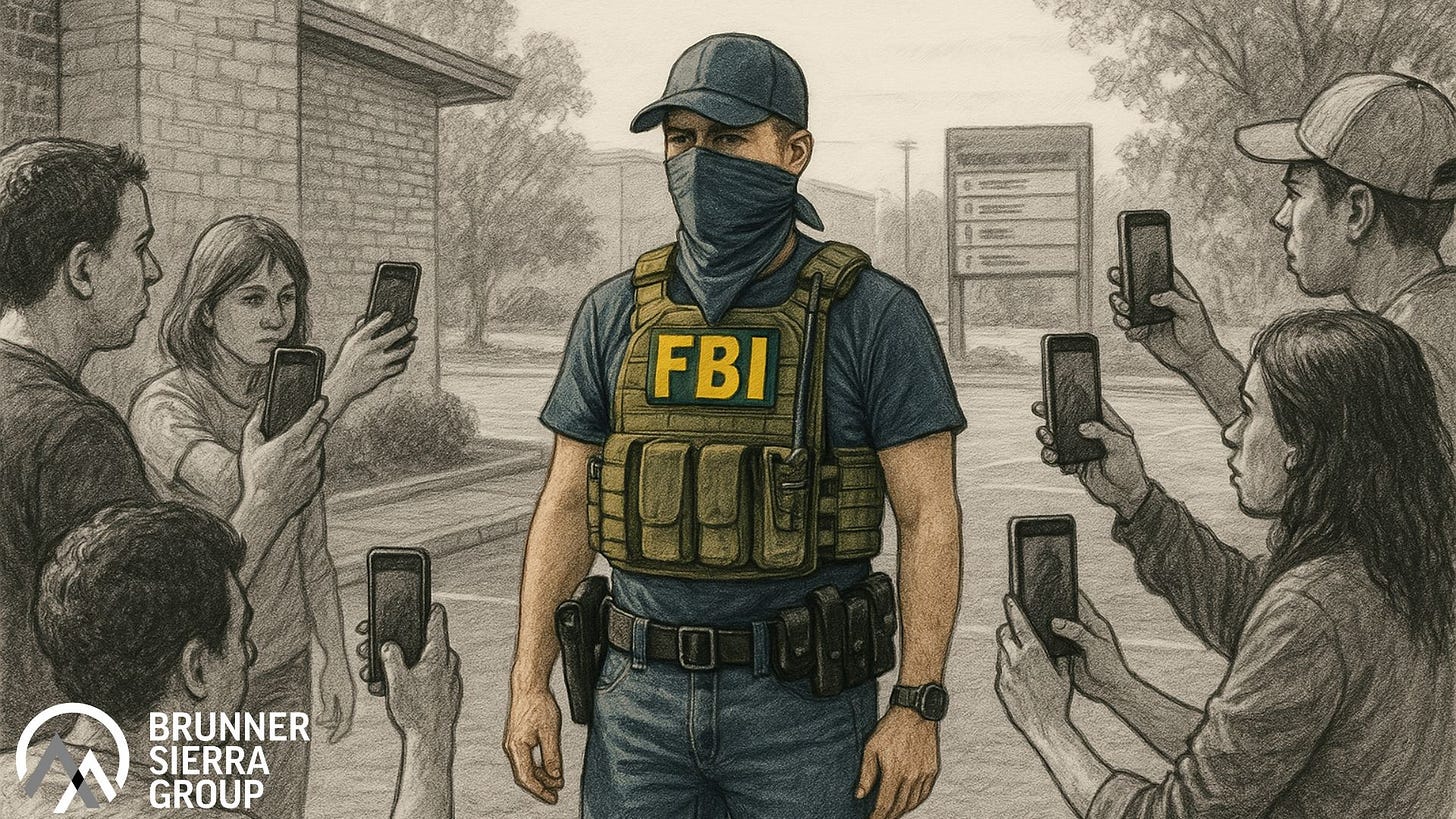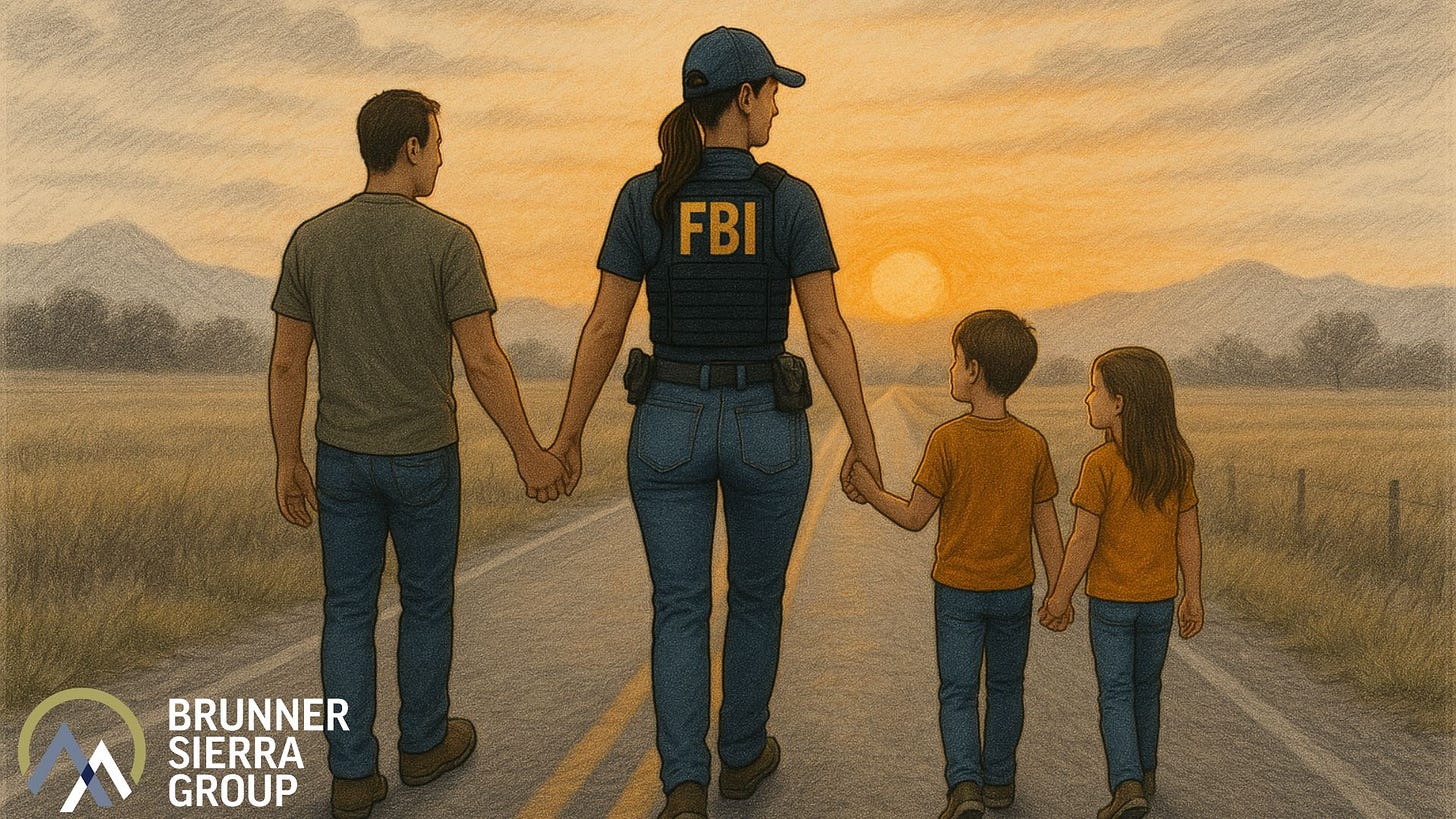Masked for Safety, Not Secrecy: The Reality Facing Today’s Federal Agents
An inside look at how political hostility, misinformation, and internet exposure are changing the rules of engagement for federal officers.
By Daniel Brunner | COO | Brunner Sierra Group
“Cowards!!”
“Racists”
“Fascists”
“Nazis”
“They probably traded one hood for another” (adding a photo of a Klu Klux Klan member in full hood).
These are just a few of the comments left on only two articles I read over the past few days discussing how FBI, ATF, ICE and other federal agencies have recently conducted operations where many agents wore face masks. The articles question why so many agents now choose to mask up when it was rare in the past. But the comments—like those mentioned above—that my former colleagues, and I would too, wear masks during every operation today. I’m not here to debate the purpose of these operations. Whether you lean left, right, or somewhere in between, that’s your business. I’m here to address the wave of masked agents.
Beyond the Badge
For twenty years, I carried a badge and gun as a Special Agent with the FBI, working the streets of New Jersey, Mexico, El Salvador, and other parts of the world. I hunted MS-13 killers, cartel traffickers, and international fugitives tied to criminal empires like Tren de Aragua. During all that time—except for the COVID-19 pandemic—I never wore a mask during operations. Not because I was tougher or braver than today’s agents, but because the threat landscape was different.
Back then, the greatest threat came from the criminals in front of us, not the camera phones behind us. I knew my targets were unlikely to come after me outside of my official duties. In fact, the criminal world strongly discouraged putting a hit on an FBI agent. They understood the blowback would devastate their operations.
Today, the environment has changed. You see it on television, in social media feeds, and across digital platforms. Many agents I worked alongside just a few years ago now wear masks during operations. Critics call it intimidation—a heavy-handed tactic to scare the public and the subjects of investigations. But this change isn’t about intimidation. The threats aren’t just on the streets anymore—they’re online. And in the digital age, protecting an agent’s identity isn’t just smart. It’s essential.
The True Reason Behind the Mask
Let’s be clear: agents don’t wear masks to hide from justice—they wear them to protect lives. Today’s agents face a real and growing threat of being “doxxed”—having their personal information spread online. Just look at a handful of the people voicing outrage from behind keyboards, like those I mentioned at the start of this article. Some are genuinely upset—and let me be absolutely clear—they have every right to be upset. That’s what makes this country great. But having a right to be upset doesn’t make them right.
Now imagine just one of those angry individuals has the resources and determination to act. With enough effort, they could identify one of the “cowards” or “racist” federal officers they rail against online. They could uncover where the agent lives, who they’re married to, and even where their children go to school. If those who are doxxed are lucky, the only thing that happens is the online hate, the phones calls, the emails produce an annoyance to the victim of doxxing. But, I’ve seen what normally can happen, is the protests, the Swatting calls, and false allegations which pop on line. But, what could be the worst, if one individual, who is willing to go the extra mile, takes it upon himself to “send a message”, violence could ensue.
We’ve reached a point where nearly every operation is filmed, live-streamed, dissected, and politicized. If someone links an agent’s face to an immigration arrest, their life can spiral—not because of the individuals in the house they’re raiding, but because of the anonymous masses watching from their phones, armed with outrage and a Wi-Fi connection.
Political Vitriol and Keyboard Vigilantes
Today’s most dangerous threat to agents isn’t always a cartel assassin or gang enforcer—it’s a civilian with a grudge and a social media account. The political divide in this country has grown so toxic that people no longer judge law enforcement actions by facts, but by which side of the aisle they seem to support.
Agents face false accusations of being racists, fascists, or members of hate groups—without a shred of evidence. These aren’t just attacks on reputation anymore; they’re assaults on entire lives and careers. The damage spills over into families, churches, schools, and communities, leaving behind a path of destruction no badge can shield.
There Is No Legal Obligation to Show a Face
Many critics don’t understand federal law or policy. There is zero legal requirement for any federal agent—be it FBI, DEA, ATF, or ICE—to show their face during an operation. What matters is proper identification: a badge, a marked vest, or other clear indicators of law enforcement status. That is what’s required. Not transparency for the sake of public curiosity.
People confuse legal obligations with what they believe they deserve to see on their phone screens. Warrants are executed under the supervision of the courts. Agents aren’t required to hand over documentation on the front lawn for bystanders to approve. There are many that will make accusations that there have been arrests, detentions and “kidnappings” off the streets of, masked, unmarked individuals. I welcome anyone who is reading this to comment on this article, and provide me clear evidence, not just an opinion. Video, photograph, sworn court room testimony. Please. Prove me wrong, because you cannot. There are numerous news outlets that lead the reader to believe that “Masked Agents arrested…” but upon further review the video shows Agents taking out a badge from around their neck right before they place an individual in custody. Again, whether the detention/arrest is legal, moral, correct is not what I am talking about here today. All I am discussing is the tactics used by the Agents utilizing a face mask.
After the Cameras Go Off
Once the suspect is in custody and the scene is secure, those masks come off. Inside processing centers, in briefing rooms, and back in their vehicles, agents breathe a little easier. The subject will see the face of those arresting them. The mask serves one purpose—to protect their families from a broken public discourse that no longer respects due process.
No agent wants to be the face on a viral video that leads to threats against their spouse or kids. This isn’t Hollywood; these are real people doing a real job in an era that’s grown hostile to public service. They’re trying to do what they swore an oath to do: uphold the law, not become a target.
Support for the Agents Who Still Show Up
I stand with these agents—men and women who still lace up their boots and walk into unknown danger every day. They’re not hiding because they fear confrontation; they’re masking up because they’ve seen what happens when the internet targets someone. I’ve been there. I’ve knocked on doors where the threat was on the other side. But today, the threat might be across the country, typing in a basement, launching a campaign of harassment that can shatter a life of an individual and their family. Law enforcement in America remains one of the last lines of order. If we tear down those behind the badge simply because we disagree with their orders, we won’t like what fills the void.







Great read it really is crazy how in America people have compared ice to the gestapo makes me wonder how people arrive at that conclusion either there repeating something someome else said or they are ignorant and have never picked up a book again great article and always enjoy listening to you on a podcast
Terrific article and timely with what LEOs face today. BTW, you had me at your introduction, “ For twenty years, I carried a badge and gun as a Special Agent with the FBI, working the streets of New Jersey, Mexico, El Salvador, and other parts of the world. I hunted MS-13 killers, cartel traffickers, and international fugitives tied to criminal empires …” I can absolutely relate—I worked in all 3 venues as a federal agent and have memorialized those times in my true crime memoir “A Cop’s Son.” I digress. Your points are well made. As you lay it out, it’s a particularly nasty environment which requires ‘masking up.’ Thanks for sharing your thoughts & observations! 👮♀️🕵️♂️🇺🇸